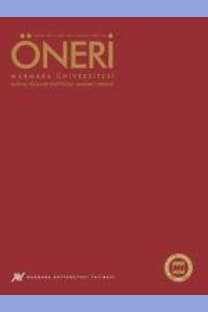DEĞİŞİM YÖNETİMİ ANLAYIŞI OLARAK ÖĞRENEN ORGANİZASYONLAR
Günümüzde, pazar ve teknoloji kaynaklı çevresel gereksinimler işletmeleri sürekli olarak değişime zorlamaktadır. Bu değişim baskıları karşısında işletmelerin sürekli bir gelişme ve/veya dönüşme yeteneğine sahip olmaları gerekmektedir. Öğrenen organizasyon anlayışı, uyumcu (adaptive) veya üretken (genarative) öğrenme yolu ile işletmelerin sürekli gelişme ve/veya dönüşme yeteneğine kavuşmasına olanak sağlamaktadır. “Program” düzeyinde alınan önlemlerin değişim baskısını karşılamada yetersiz kalması nedeniyle, işletmelerin değişim yönetimi uygulamaları süreklilik taşıyan bir anlayışa sahip olmak zorundadır. Bu ise işletmelerin birer öğrenen organizasyon olmaları gerektiği sonucunu doğurmaktadır. Bu çalışmada önce örgütsel öğrenme ile öğrenen organizasyonların tanımlanmaları ve gelişme süreçlerini takiben değişim yönetimi olarak öğrenen organizasyon anlayışı üzerinde durulacak ve son olarak ise, rekabet avantajı sağlama açısından başarılı öğrenen organizasyonların ayrılmaz parçası olan bilgi yönetim üzerinde durulacaktır.
Anahtar Kelimeler:
Örgütsel Öğrenme, Öğrenen Organizasyon, Değişim Yönetimi
___
- [1] Pemberton, J.D. & Stonehouse, G.H. (2000). Organisational learning and knovvledge assets-an essential partnership. The Learning Organization, 7(4), 184-193.
- [2] Mumford, A. (2000). A learning approach to strategy. Journal of IVorkplace Learning, 12(7), 265-271.
- [3] Argyris, C. & Schon, D. (1996). Organizational Learning II - Theory, Method, and Practise, Reading: Addison Wesley.
- [4] Moilanen, R. (2001). Diagnostic tools for learning organizations. The Learning Organization, 8(1), 6-20.
- [5] Starkey, K. (1996). How Organization Learn. London: Thomson.
- [6] Wren, D.A. (1994). The Evolution of Management Thought. New York: John Wi!ey and Sons.
- [7] Argyris, C. & Schon, D.A. (1978). Organizational Learning: A Theory of Action Perspective. Reading -MA: Addison-Wesley.
- [8] Nevis, E.C.; DiBella, A.J. & Gould, J.M. (1995). Understanding Organizations as Learning Systems. Sloan Management Review, 36(2), 73-85.
- [9] Ulrich D.; Von Glinow, M.A. & Jick, T. (1993). High- Impact Learning. Organizational Dynamics, Autumn, 53- 58.
- [10] Argyris, C. (1977). Double Loop Learning in Organizations. Harvard Business Review, 55(5), Sept.-Oct., 115-124.
- [11] Senge, P.M. (1990). The Leader’s New Work: Building Learning Organizations. Sloan Management Review, 32(1), Fail, 7-23.
- [12] Nicolini, D. & Meznar, M.B. (1995) The social construction of organizational learning: conceptual and practical issues in the fîeid. Human Relations, 48(7), 727- 746.
- [13] McGill, M.; Slocum, J. & Lei, D. (1992). Management practices in learning ûrganisations. Organizational Dynamics, 21(1), Summer, 5-17.
- [14] Kolb, D.A.; Ruhin, I.M. & Osland, J. (1991). Organizational Behavior: An Experiential Approach, New Jersey: Prentice-Hall.
- [15] Huber, G. (1991). Organizational Learning: The Contributing Process and Literatüre. Organizational Science, 2, 88-115.
- [16] Pınar, î., (1999). Öğrenen Organizasyonların Kültürel Çerçevesi. İ.Ü. İşletme Fakültesi Dergisi, 28(2), Kasım, 37-
- [17] Romme, G. & Dillen, R. (1997). Mapping the landscape of organizational learning. European Management Journal, 15(1), 68-78.
- [18] Weick, K. (1991). The non-traditional quality of organizational learning. Organizational Science, 2(1), 116- 123.
- [19] Argyris, C. (1992). On Organisational Learning. New York: Blackwell. [ 20] Appelbaum, S.H. & Goransson, L. (1997). Transformational and adaptive learning within the learning organization: a framework for research and application. The Learning Organization, 4(3), 115-128.
- [21] Steiner, L. (1998). Organizational dilemmas as barriers to learning. The Learning Organization, 5(4), 193-201.
- [22] Keidel, R.W. (1994). Rethinking Organizational Design. Academy of Management Executive, 8(4), 12-27.
- [23] Matlay, H. (1997). Learning Organisations in Context: A Literatüre Review. London: EDEXEL.
- [24] Dodgson, M. (1993). Organisational learning: a review of some literatures. Organisation Studies, 14(3), 375-394.
- [25] Moingeon, B. & Edmondson, A. (1996). Organisational Learning and Competitive Advantage. London: Sage Pub.
- [26] Rothwell, R. (1992). The fıfth generation innovation process. R&D Management, 22(3), 221-239.
- [27] Senge, P.M.* (1990). The Fifth Discipline: The Art and Practice of the Learning Organization. New York: Doubleday.
- [28] Gieskes, J.F.B. & Ten Broeke, A.M. (2000). Infrastructure under construction: continuous improvement and learning in projects. Integrated Manufacturing Systems, 11(3), 188-198.
- [29] Pedler, M.; Burgoyne, J. & Boydell, T. (1996). The Learning Company - A Strategy for Sustainable Development. 2nd Ed. London: McGraw-Hill.
- [30] McGill, M.E. & Slocum, Jr., J.W. (1993). Unlearning the Organizations. Organizational Dynamics, 22(2), Autumn, 70-86.
- [31] Beer, M.; Eisenstat, R.A. & Spector, B. (1990). Why Change Programs Don’t Produce Change. Harvard Business Review, 68(6), Nov.-Dec., 158-166.
- [32] Garvin, D.A., (1993). Building a Learning Organization. Harvard Business Review, 71(4), Jully-August, 78-91.
- [33] Stata, R. (1989). Organizational Learning - The Key to Management innovation. Sloan Management Review, 30(3), Spring, 63-74.
- [34] Matzdorf, F.; Price, I. & Green, M. (2000). Barriers to organizational learning in the chartered surveying profession. Property Management, 18(2), 92-113.
- [35] Harvey, C. & Denton, J. (1999). To come of age: the antecedents of organizational learning. Journal of Management Studies, 36(5), December, 897-918.
- [36] Stonehouse, G.H. & Pembertön, J.D. (1999). Learning and knowledge management in the intelligent organisation. Participation and Empowerment: An International Journal, 7(5), 131-144.
- [37] Demarest, M. (1997). Understanding knovvledge management. LongRange Planning, 30(3), 374-384.
- [38] Nonaka, I., (1991). The knowledge-creating company. Harvard Business Review, 79(1), Nov.- Dec., 96-104.
- ISSN: 1300-0845
- Yayın Aralığı: Yılda 2 Sayı
- Başlangıç: 1994
- Yayıncı: Marmara Üniversitesi
Sayıdaki Diğer Makaleler
TÜRK İHRACAT ŞİRKETLERİNE İNTERNET’İN KATKILARI ÜZERİNE BİR SAHA ARAŞTIRMASI
EKOLOJİK RİSKLER, SİGORTA PAZARINA ETKİLERİ VE ÇÖZÜM ÖNERİLERİ
Ayşe Gül BÖLÜKBAŞI, E. Baturalp PAMUKÇU
SANAYİ PLÂNLARININ HAZIRLANMASINA TEMEL TEŞKİL EDEN RAPORLAR
Selin KÜÇÜKKANCABAŞ, Ayşe AKYOL, Berk M. ATAMAN
DEĞİŞİM YÖNETİMİ ANLAYIŞI OLARAK ÖĞRENEN ORGANİZASYONLAR
SİYASETİN AKIBETİ: İDEOLOJİ VE ÜTOPYA
KARİYER DEĞERLERİNİN ANALİTİK HİYERARŞİ PROSES YÖNTEMİYLE ÖNCELİKLENDİRİLMESİ
ÇALIŞANLARIN TEŞVİKİNDE KÜLTÜREL BOYUTLAR: AYIN ELEMANI UYGULAMASI
SANAYİ İŞLETMELERİNDE UYGULANAN MALİYET MUHASEBESİ POLİTİKALARININ ARAŞTIRILMASI: KAYSERİ ÖRNEĞİ
